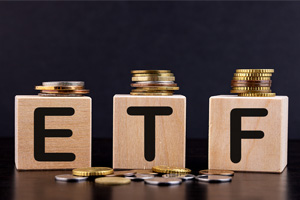Gold is deeply entrenched in India's cultural tapestry. The precious metal has transcended centuries as a symbol of wealth, heritage, and faith. In the contemporary era, the evolution of financial markets has brought in new and innovative avenues to invest in gold. One such way is through gold Exchange-Traded Funds (ETFs). This financial instrument is a dynamic asset with many benefits. What is a gold ETF, and how can you invest in it? Read this article and find out for yourself!
What is a gold ETF, and how do you trade in it?
Gold ETFs are a specific category of ETFs that focus on investing in gold bullion.
ETFs, in general, are passively managed investments that track the performance of a particular market index. They operate by pooling money from multiple investors and investing it in a diversified basket of securities, which can include stocks, bonds, commodities, and more.
Gold ETFs are a subset of commodity ETFs that specialise in investing in precious metals, with a primary focus on gold. Gold ETFs track the piece of domestic gold. Similar to mutual funds, they pool money from investors, but like stocks, they are traded on stock exchanges. You can buy and sell shares of gold ETFs on the stock market at any time during market hours.
Let's find out a bit about the benefits of gold ETFs.
Benefits of gold ETFs
- Exposure to gold without the hassles of physical gold: Gold ETFs offer exposure to the price movements of domestic gold without the need for physical ownership. They eliminate the concerns and costs related to physical storage and security, as well as the hassles of reselling.
- Dual benefits: The unique feature of ETFs lies in their hybrid nature. They combine aspects of both stocks and mutual funds. So, you get to invest in a diversified portfolio of gold-related assets. At the same time, you enjoy high liquidity and can buy and sell units on the stock exchanges quickly.
- Tax efficiency: You do not have to pay Security Transaction Tax (STT) or Goods and Service Tax (GST) on gold ETFs.
- Purity and transparency:Each unit of Gold ETFs is backed by physical gold of high purity. Furthermore, the transparency and real-time tracking of gold prices allow you to monitor the value of your investments accurately.
- Collateral for loans:Gold ETFs are widely accepted as collateral for loans.
- No entry and exit load:Gold ETFs typically do not have any entry or exit loads. This allows you to buy and sell units without incurring additional charges.
Who should invest in gold ETFs?
Anybody can invest in gold ETFs. They can be ideal if you want exposure to gold without the need to own and store it physically. Since gold ETFs are held in dematerialised (demat) form, you do not have to worry about the costs of storing and safeguarding physical gold. Additionally, gold ETFs allow you to purchase units in small denominations, such as one gram. This can enable you to invest in the precious metal without substantial capital.
You can also invest in gold ETFs if you want to diversify your portfolio. Gold is a potent hedge against inflation and is not affected by the stock market.
Now that you know who can invest in gold ETFs, you must also know how to invest in them.
How to invest in gold ETFs?
- You need to have a Demat and a Trading account to invest in gold ETFs. You can open these with any registered stockbroker or a financial institution.
- Select a desired gold ETF you wish to invest in.
- Place an order through your account.
- Specify the quantity of ETF units you want to purchase and confirm the order.
Alternatively, you can get exposure to gold ETFs through gold ETF Fund of Funds (FOFs) offered by Asset Management Companies (AMCs).
To sum it up
Gold ETFs offer a convenient way to participate in gold investing. Their benefits range from exposure to gold without physical hassles to transparency in pricing and high liquidity. They can be suitable for all types of investors. However, there are several gold ETFs in the market, and it is advised to research well before investing in one.
An investor education initiative by Edelweiss Mutual Fund
All Mutual Fund Investors have to go through a one-time KYC process. Investors should deal only with Registered Mutual Fund (RMF). For more info on KYC, RMF and procedure to lodge/redress any complaints, visit - https://www.edelweissmf.com/kyc-norms
MUTUAL FUND INVESTMENTS ARE SUBJECT TO MARKET RISKS. READ ALL SCHEME RELATED DOCUMENTS CAREFULLY
Trending Articles
MUTUAL FUND INVESTMENTS ARE SUBJECT TO MARKET RISKS, READ ALL SCHEME RELATED DOCUMENTS CAREFULLY.




















